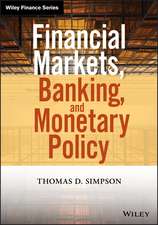Exchange Rate Politics in Latin America
Editat de Carol Wise, Riordan Roetten Limba Engleză Paperback – oct 2000
Most of the analysis of Latin American exchange rate problems and policies has concentrated on the economic side of things. This volume instead examines the politics of exchange rate management in four nations that had very different approaches and results. Although the Mexican peso crash, Brazil's currency crisis, Argentina's maintenance of a currency board, and Venezuelan policy responses to the shocks of 1997-98 have had major international financial ramifications, the origins and outcomes of these dramatic events have yet to be analyzed in a single volume. The contributors tie these policy episodes together using solid comparative analysis, in order to better inform the policy debate on these issues.
Preț: 195.63 lei
Nou
Puncte Express: 293
Preț estimativ în valută:
37.43€ • 39.08$ • 30.98£
37.43€ • 39.08$ • 30.98£
Carte tipărită la comandă
Livrare economică 04-18 aprilie
Preluare comenzi: 021 569.72.76
Specificații
ISBN-13: 9780815794875
ISBN-10: 0815794878
Pagini: 160
Dimensiuni: 152 x 229 x 13 mm
Greutate: 0.26 kg
Ediția:New.
Editura: Brookings Institution Press
Colecția Brookings Institution Press
ISBN-10: 0815794878
Pagini: 160
Dimensiuni: 152 x 229 x 13 mm
Greutate: 0.26 kg
Ediția:New.
Editura: Brookings Institution Press
Colecția Brookings Institution Press
Notă biografică
Carol Wise is associate professor of international relations at the University of Southern California. Her most recent books include Reinventing the State: Economic Strategy and Institutional Change in Peru (Michigan, 2003) and with Riordan Roett, Post Stabilization Politics in Latin America: Competition, Transition, Collapse (Brookings, 2003).
Descriere
Most of the analysis of Latin American exchange rate problems and policies has concentrated on the economic side of things. This volume instead examines the politics of exchange rate management in four nations that had very different approaches and results. Although the Mexican peso crash, Brazil's currency crisis, Argentina's maintenance of a currency board, and Venezuelan policy responses to the shocks of 1997-98 have had major international financial ramifications, the origins and outcomes of these dramatic events have yet to be analyzed in a single volume. The contributors tie these policy episodes together using solid comparative analysis, in order to better inform the policy debate on these issues.











